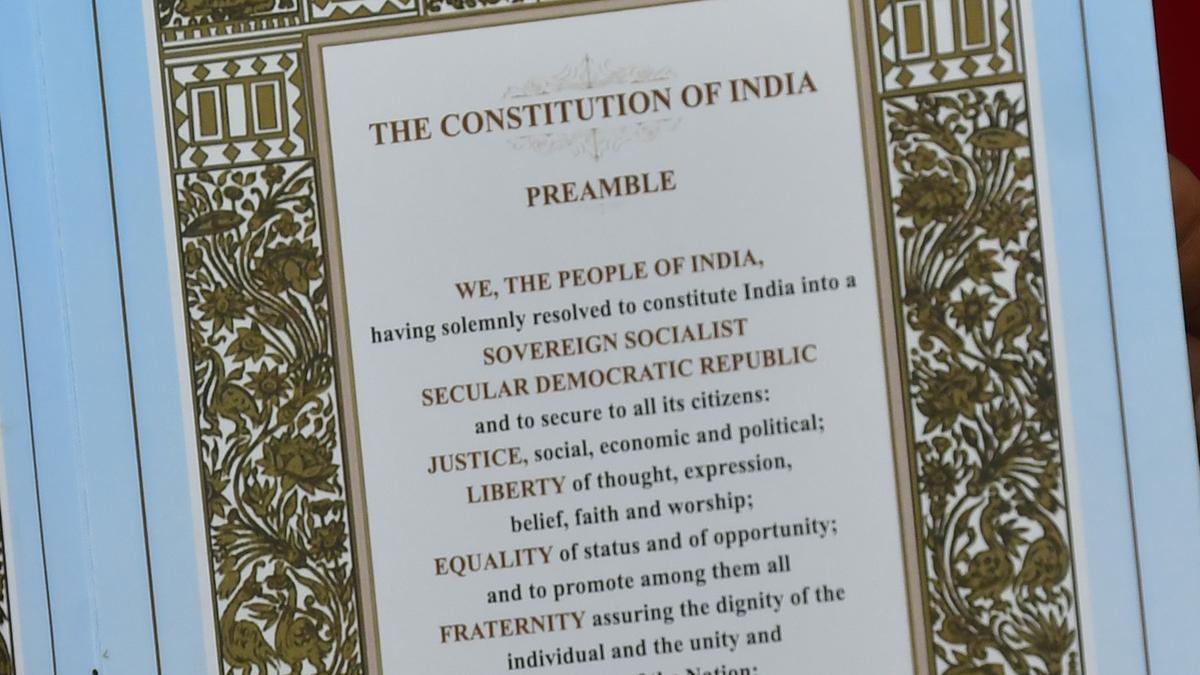 |
|
The Supreme Court of India delivered a significant verdict on November 25th, 2024, upholding the inclusion of the words 'socialist' and 'secular' in the Preamble to the Indian Constitution. This decision, handed down by a bench headed by Chief Justice Sanjiv Khanna, effectively dismissed a challenge brought forth by prominent figures, including BJP leader Subramanian Swamy, who contested the validity of the 42nd Amendment Act of 1976. This amendment, enacted during the Emergency period, retrospectively added these two words, significantly altering the fundamental character of the nation's foundational document. The court's ruling not only affirms the legality of this amendment but also provides crucial insights into the interpretation of the Constitution's amendment powers and the evolving understanding of the Indian nation's core principles.
The central argument of the petitioners focused on the assertion that the amendment, particularly the alteration of the Preamble, exceeded the permissible scope of Article 368, which outlines the procedure for constitutional amendments. They argued that the Preamble, representing the spirit and essence of the Constitution, should be immune to such alterations. The court, however, took a different stance, emphasizing the inherent flexibility within the Constitution to adapt and evolve in response to changing national priorities and societal needs. The judgment explicitly confirmed that Article 368 extends to the Preamble, thus granting the legislature the power to amend even this foundational element of the document. This underscores the dynamic nature of the Constitution and its ability to reflect the nation's progress and changing political landscape.
The court's interpretation of the word 'socialism' within the context of the Preamble proved particularly significant. The ruling clarified that its inclusion does not signify an endorsement of any specific economic doctrine or ideology but rather reflects a commitment to a welfare state. This interpretation effectively defuses potential arguments suggesting that the amendment imposes a rigid socialist model, precluding alternative economic policies. The court's approach highlights the Constitution's ability to accommodate diverse economic perspectives and strategies while upholding its foundational commitment to the well-being of its citizens. This nuanced interpretation successfully navigates the complex interplay between ideological principles and practical governance, thereby avoiding the imposition of a singular, restrictive economic framework.
The timing of the verdict, delivered a day before Constitution Day, adds a layer of symbolic weight to the decision. It serves as a timely reminder of the ongoing evolution of India's constitutional framework and the continuous process of interpreting and adapting the document to meet the challenges and aspirations of a modernizing nation. The case highlights the ongoing debate surrounding the interpretation and application of fundamental constitutional principles, emphasizing the dynamic nature of legal and political discourse in India. The ruling not only settles the legal challenge but also provides an important framework for future debates on constitutional amendment and the interpretation of the Preamble.
The implications of this judgment extend beyond the immediate legal context. The reaffirmation of the 'socialist' and 'secular' elements in the Preamble carries significant political weight, particularly given the ongoing political discourse surrounding these concepts in India. The decision might be seen by some as a validation of the nation's commitment to social justice and secular values, while others may interpret it differently. This makes the ruling not just a legal matter but also a significant political event with wide-ranging repercussions. Furthermore, this case serves as a valuable precedent for future legal challenges concerning constitutional amendments, providing a clearer understanding of the boundaries of Article 368 and its application to the Preamble. This ruling will undoubtedly shape future legal arguments and interpretations of the Indian Constitution.
The Supreme Court's decision to uphold the inclusion of 'socialist' and 'secular' in the Preamble solidifies their place within the fundamental principles of the Indian Constitution. While the petitioners attempted to challenge the legitimacy of the 42nd Amendment Act, the court firmly rejected these arguments, emphasizing the Constitution's capacity for amendment and adaptation. The careful interpretation of the term 'socialism' as indicating a commitment to a welfare state, not a rigid economic ideology, is particularly noteworthy and displays a nuanced understanding of constitutional principles and their application within a complex socio-political landscape. The ruling, delivered on the eve of Constitution Day, serves as a powerful statement about the enduring relevance of the Constitution and its ability to adapt to the changing needs of the nation.
Source: SC order upholds the inclusion of ‘socialist, secular’ in the Preamble of the Constitution
